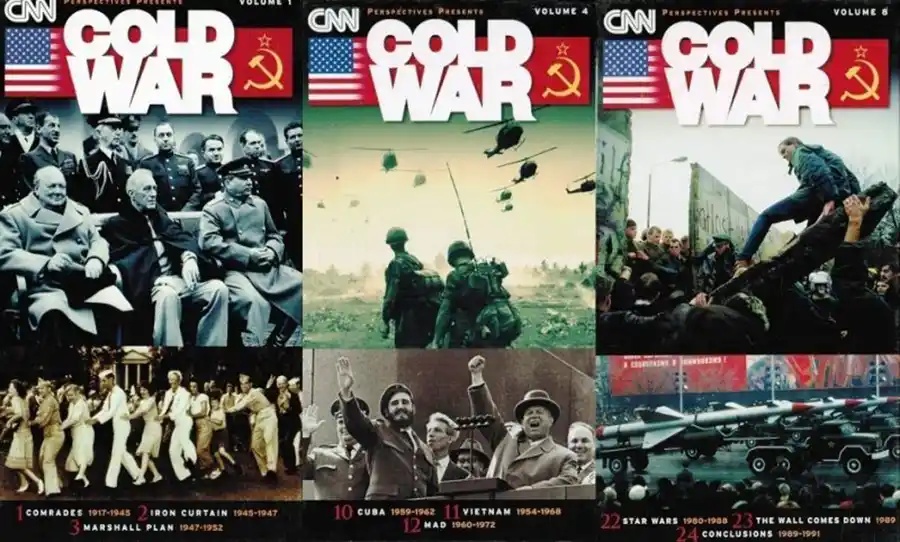Cold War episode 14 – Make Love, not War: The Sixties – As the Western economies experienced growth and prosperity during the mid-20th century, a significant portion of this success was fueled by the production of armaments. This era saw young people rejecting the affluence of their parents’ generation and the political tensions of the Cold War. Many among the youth chose to protest and rebel, resulting in a surge of countercultural movements. In the United States, inner cities were plagued by racial violence, while rock music emerged as the voice of a disenchanted generation.
Entering the 1960s with a strong sense of self-confidence, the United States, under the leadership of President John F. Kennedy, amplified arms production, which in turn brought about an economic boom, particularly in California. This period of rising expectations and increased prosperity paved the way for the civil rights movement to gain momentum. The movement faced considerable resistance from authorities who often perceived it as being inspired by Communist ideologies.
American youth became increasingly disillusioned with the ongoing Vietnam War and turned towards embracing new counterculture movements and alternative interpretations of the American ideals of freedom. As a result, fractures within American society deepened and became more violent. The latter half of the 1960s witnessed race riots, the tragic assassinations of prominent figures such as Martin Luther King Jr. and Robert F. Kennedy, as well as the infamous protests during the Chicago Democratic Convention.
The political left appeared to be increasingly divided and radicalized, which ultimately led to the election of Richard Nixon as President of the United States. Key figures and interviewees from this transformative period in American history include prominent individuals such as Irwin Allen Ginsberg, Bobby Seale, and Eugene McCarthy, who each played a significant role in shaping the social, cultural, and political landscape of the time.
Cold War episode 14 – Make Love not War: The Sixties – Exploring the Legacy of the Cold War Era
Unraveling the Social Revolution of the Sixties
The Impact of the Cold War
The Sixties, a decade defined by its counterculture and the birth of the “Make Love, Not War” movement, was heavily influenced by the tensions of the Cold War. As the United States and the Soviet Union stood on the brink of nuclear conflict, the youth of the era rebelled against the established norms and sought to create a more peaceful, loving society.
Many individuals, particularly the younger generation, grew disillusioned with the political climate and the threat of mutually assured destruction. This disenchantment sparked an era of activism, giving rise to the Civil Rights Movement, the Women’s Liberation Movement, and the Anti-War Movement, among others. These movements sought to promote equality, love, and peace, both at home and abroad.
During this time, music, art, and literature became vehicles for promoting peace and unity. The Beatles, Bob Dylan, and Joan Baez used their talents to spread messages of love and hope, while authors like Ken Kesey and Hunter S. Thompson challenged societal norms through their writing. This creative burst helped to shape the counterculture and the spirit of the Sixties.
The Rise of the Counterculture
At the heart of the Sixties lay the counterculture, a social and cultural revolution that sought to challenge the status quo. Fueled by the desire for change, the counterculture consisted of individuals who embraced alternative lifestyles, rejected mainstream values, and advocated for peace, love, and understanding. Hippies, as they were often called, formed communes, experimented with alternative spirituality, and celebrated the power of love and human connection.
The counterculture’s influence permeated society, with iconic events like the Summer of Love in 1967 and the Woodstock Music and Art Fair in 1969 showcasing the movement’s ideals. These gatherings united people from all walks of life, transcending race, class, and political affiliations, and fostered a sense of community that remains unmatched to this day.
As the Sixties progressed, the counterculture’s focus on love and peace began to blend with a call for political and social change. Protesters marched against the Vietnam War and fought for civil rights, women’s rights, and environmental protection. These demonstrations ultimately helped to reshape the cultural landscape and redefine the meaning of love and war in the public consciousness.
The Legacy of the Sixties
The Sixties left an indelible mark on history, forever altering the way we view love, war, and the pursuit of social justice. The era’s impact can still be felt today, as contemporary movements continue to draw inspiration from the values and activism of the Sixties. In many ways, the spirit of the “Make Love, Not War” movement remains alive and well, shaping the world in its image.
From the Civil Rights Movement to the Women’s Liberation Movement, the Sixties’ legacy of activism has set the stage for ongoing struggles for equality and justice. The lessons of the era, such as the power of peaceful protest and the importance of standing up against oppression, continue to inform our understanding of human rights and social justice issues.
Moreover, the Sixties’ emphasis on love and human connection remains a guiding force in today’s interconnected world. As we navigate the challenges of the 21st century, the enduring message of the “Make Love, Not War” movement encourages us to prioritize empathy, compassion, and understanding. By embracing the values that defined the Sixties, we can work towards a brighter, more inclusive future for all.
Ultimately, the Sixties taught us that love can be a powerful force for change. By harnessing this energy, we can challenge the status quo and make a lasting impact on the world around us. The spirit of the “Make Love, Not War” movement serves as a reminder that love, not war, should guide our actions and shape our global community.




